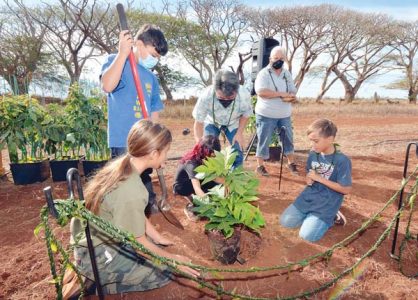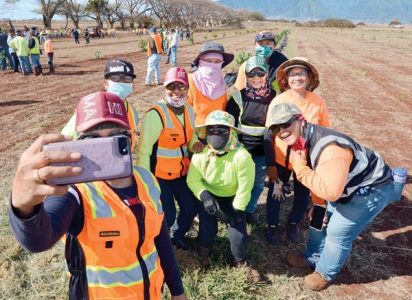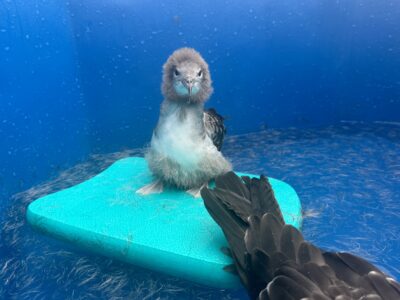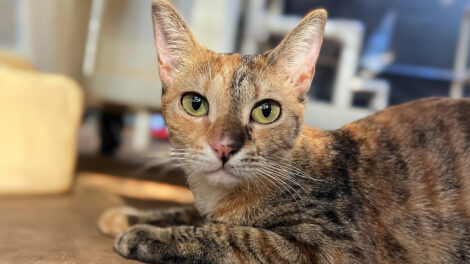Mahi Pono hits milestone of 1 million trees planted
Most trees still maturing; papayas already being sold in markets
More than 600,000 citrus trees, 300,000 coffee trees and 21,000 papaya trees have been planted in less than three years by Mahi Pono in Maui’s central plain, according to the farming company, which celebrated the milestone of 1 million trees planted on Tuesday.
“I know today we celebrate a millionth tree and it’s a number, it’s an important number, but the reality is that each of these trees, each and every one of them, represent more than that, right?” said Shan Tsutsui, Mahi Pono’s chief operating officer, during a ceremony at the company’s ‘ulu field off the Paia-bound side of Hana Highway. “They represent the hope, the dreams and the future of our community. That’s really important and I think our workers take that to heart every day.”
The company’s 300 employees also joined in the event and were applauded for their efforts. Guests and some employees also planted trees.
Overall, most of the trees in the fields are still maturing, although papaya trees have borne fruit and have been sold to various local stores and distributors, Tiare Lawrence, Mahi Pono’s community relations director, said after the ceremony.
Lawrence, who gave a breakdown of the trees during the event, said that there are 626,574 different types of citrus trees, including limes, lemons, oranges, tangerines and grapefruit. The are also 334,150 coffee trees, 1,009 avocado trees, 21,780 papaya trees and 17,896 trees used as windbreakers. This includes panax, hau and milo trees. There are also 300 each of ‘ulu, coconut and macadamia nut trees.
“And we are just getting started,” Lawrence told the audience.
In 2018, Mahi Pono took over stewardship of 41,000 acres of former sugar cane land that was previously owned by Alexander & Baldwin, after Hawaiian Commercial & Sugar Co. shut down its sugar operations at the end of 2016.
Mahi Pono is a joint venture between Pomona Farming LLC, a California-based agricultural group and the Public Sector Pension Investment Board, one of Canada’s largest pension investment managers.
Mahi Pono has tried to distance itself from the former sugar plantation but has nonetheless inherited many of the longtime disputes that came with the land, including concerns over monocropping and environmental practices, as well as diversion of water from the East Maui Irrigation system that the company owns jointly with A&B. In September the state Board of Land and Natural Resources accepted an environmental study for a proposed long-term permit for the water system, though the decision did not guarantee a lease. Mahi Pono has said if the lease is granted, allowing roughly 92 million gallons per day of surface water, that it would be able to yield 338 million pounds of food per year.
Even as a million trees have been planted, Lawrence said the farm has still lots of challenges, including dealing with the wind, drought, pests, weeds, flooding and fire.
Those challenges have not been lost on Kainoa Casco, Mahi Pono’s project manager for farming and sustainability.
“We are just at the beginning of our sustainability journey,” said Casco, a Lahainaluna High graduate, during the ceremony. “We got a huge challenge ahead of us with something that has never been done before in the whole state with diversified agriculture at this scale. We are going to face challenges. We are already facing challenges. We are not perfect, I don’t know of any company that is perfect. And we are going to meet the challenges head on. We are going to learn from our mistakes when we make mistakes and we are going to really understand the impacts that we have, culturally, socially, environmentally and economically, and really try to bring positive impacts over the life of the company.”
Casco highlighted some of the technology incorporated into Mahi Pono’s farming.
This includes in-house custom fabricated planting machines guided by GPS technology that enabled workers to plant more than 10,000 trees per day; water-efficient drip and fanjet irrigation techniques that reduce water consumption; and installation of weedmats throughout the orchards that help keep the soil moist, which reduces water needs and the need for herbicides.
Rob Weltman, founder of ReTree Hawai’i, a statewide tree planting effort, said that trees and other plants absorb and store carbon to prevent it from reaching the atmosphere and increasing global warming. They also bind the soil and prevent runoff and erosion, he said.
“Mahi Pono’s planting of 1 million trees on our island is a major milestone in fighting climate change and we are encouraged that the company plans to continue its massive expansion of Maui’s tree cover while conserving water resources and preserving soil productivity through regenerative farming techniques,” Weltman said in a news release.
In addition to its trees, Mahi Pono has also planted potatoes and onions as well as other crops. It also has a “Chefs’ Corner Project” where Mahi Pono works with the Hawai’i Food & Wine Festival and notable chefs to personally curate and steward what is grown and harvested for their restaurants.
* Melissa Tanji can be reached at mtanji@mauinews.com.
- Mahi Pono Chief Operating Officer Shan Tsutsui gets help from youngsters Hilina‘i Kodani (from right) Khloe-Jo Teixeira, Levi Teixeira and Hinatea Kodani while planting the company’s ceremonial 1 millionth tree Tuesday morning in a field bordering Hana Highway. Looking on is Mopsy Aarona who did an oli aloha to start the tree planting ceremony. The Maui News / MATTHEW THAYER photos
- Members of a Mahi Pono planting crew pose for a selfie after being on hand to help guests plant fruit trees in a field along Hana Highway Tuesday morning.




